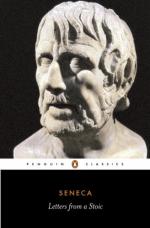|
This section contains 787 words (approx. 2 pages at 400 words per page) |

|
Letters XI, XII, XV, XVI, XVIII, XXVI, XXVII, and XXVIII Summary and Analysis
Letter XI: Seneca praises one of Lucilius' friend. He notes that the friend has a tendency to blush, but does not hold that against him. No matter how wise and virtuous a person becomes, he can never overcome those weakness inherent in him by nature. He approvingly cites Epicurus' advice that one ought to imagine being watched by some great, virtuous figure at all times in order to check one's own behavior.
Letter XII: Seneca relates going to one of his properties and noticing how dilapidated the building has become. It is a reminder of Seneca's advancing years, for he cannot expect to weather time so well as a building of stone and it is younger than he is. Old age should not...
(read more from the Letters XI, XII, XV, XVI, XVIII, XXVI, XXVII, and XXVIII Summary)
|
This section contains 787 words (approx. 2 pages at 400 words per page) |

|




